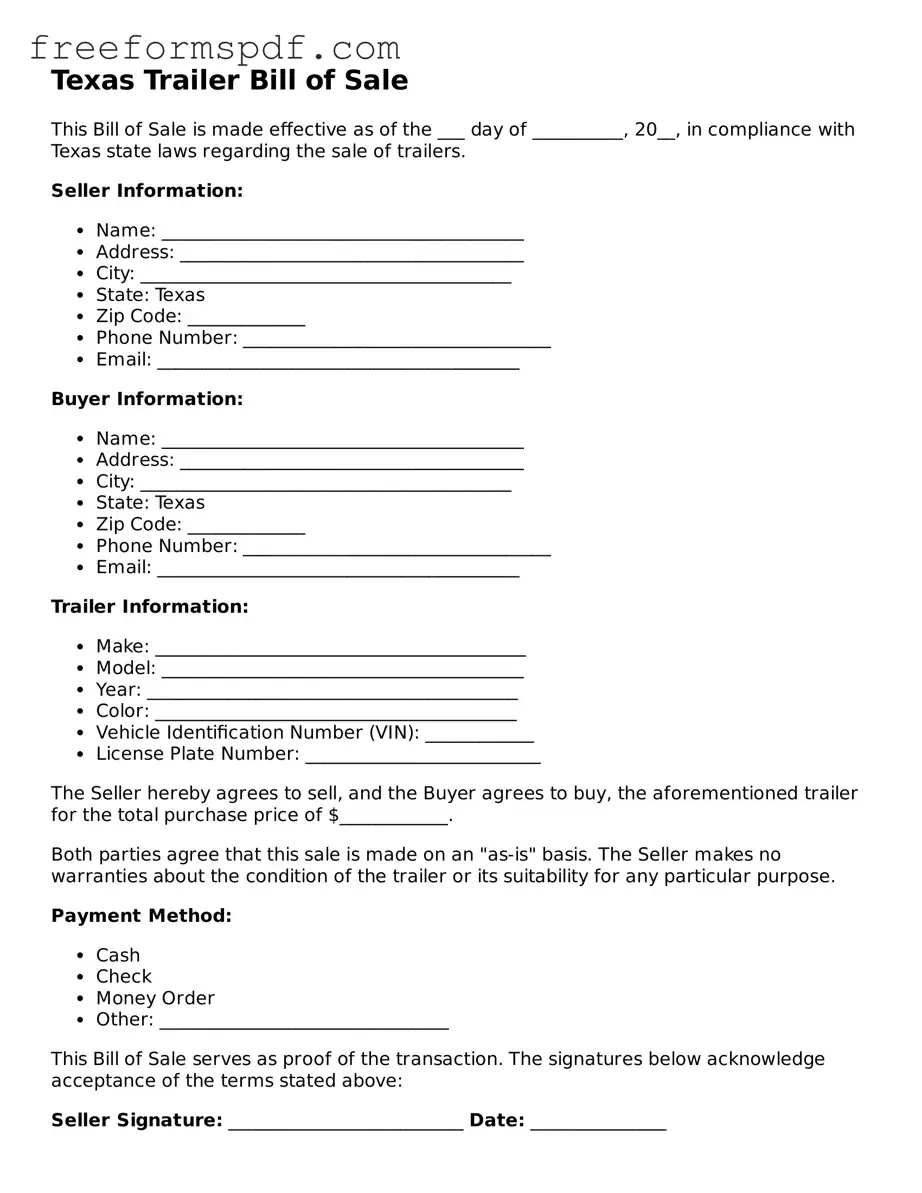Attorney-Verified Trailer Bill of Sale Document for Texas State
Common mistakes
-
Failing to include the full legal names of both the buyer and the seller. Ensure that names match those on identification documents.
-
Not providing a complete description of the trailer. Include details like the make, model, year, and Vehicle Identification Number (VIN).
-
Omitting the sale price. This is crucial for both parties and for future registration purposes.
-
Neglecting to include the date of the sale. This helps establish the timeline of ownership transfer.
-
Forgetting to sign the form. Both the buyer and seller must provide their signatures to validate the transaction.
-
Using incorrect or outdated forms. Always use the latest version of the Texas Trailer Bill of Sale.
-
Not checking for liens or encumbrances on the trailer. Ensure that the seller has the right to sell the trailer free of debts.
-
Leaving out the notarization if required. Some transactions may need a notary to verify identities.
-
Failing to provide contact information for both parties. This can be important for any future communications.
-
Not keeping a copy of the completed form. Both parties should retain a signed copy for their records.
Learn More on This Form
-
What is a Texas Trailer Bill of Sale?
A Texas Trailer Bill of Sale is a legal document that records the sale and transfer of ownership of a trailer in the state of Texas. This form includes essential details about the trailer, such as its make, model, year, Vehicle Identification Number (VIN), and the sale price. It serves as proof of the transaction between the seller and the buyer, ensuring that both parties have a record of the agreement.
-
Why is a Bill of Sale important?
A Bill of Sale is crucial for several reasons. First, it provides legal evidence of the transaction, which can be important for both tax purposes and potential disputes. Second, it helps establish the new owner's claim to the trailer, especially when registering it with the Texas Department of Motor Vehicles (DMV). Lastly, having a properly completed Bill of Sale can protect the seller from future liabilities related to the trailer after the sale has been completed.
-
What information is required on the Texas Trailer Bill of Sale?
To create a valid Texas Trailer Bill of Sale, specific information must be included. This includes:
- The full names and addresses of both the seller and the buyer.
- A detailed description of the trailer, including make, model, year, and VIN.
- The sale price and the date of the transaction.
- Signatures of both parties, indicating their agreement to the sale.
Including this information ensures that the document is comprehensive and legally binding.
-
Do I need to have the Bill of Sale notarized?
In Texas, it is not mandatory to have a Bill of Sale notarized for it to be valid. However, having it notarized can add an extra layer of authenticity and may be beneficial if there are any disputes in the future. Notarization can help verify the identities of the parties involved and confirm that they willingly signed the document.
Misconceptions
Understanding the Texas Trailer Bill of Sale form is essential for anyone buying or selling a trailer in the state. However, several misconceptions can lead to confusion. Here are eight common myths about this important document:
-
It’s not necessary for small trailers.
Many believe that only larger trailers require a bill of sale. In Texas, any trailer sale should be documented with a bill of sale, regardless of size.
-
A verbal agreement suffices.
Some think that a handshake or verbal agreement is enough. However, a written bill of sale is crucial for legal protection and clarity in the transaction.
-
Only the seller needs to sign.
Both the buyer and seller should sign the bill of sale. This ensures that both parties acknowledge the terms of the sale.
-
It can be handwritten.
While it can be handwritten, using a standardized form is recommended. This helps ensure all necessary information is included and correctly formatted.
-
It’s only for new trailers.
Many assume that the bill of sale is only needed for new trailers. In reality, it is equally important for used trailers to document the transfer of ownership.
-
It doesn’t need to be notarized.
Notarization is not required for a Texas Trailer Bill of Sale, but having it notarized can add an extra layer of legitimacy and protection.
-
It’s the same as a title transfer.
While related, a bill of sale is not the same as a title transfer. The bill of sale documents the sale, while the title transfer officially changes ownership in state records.
-
It’s only useful for the seller.
Buyers also benefit from having a bill of sale. It serves as proof of purchase and can be vital for future registrations or disputes.
Being aware of these misconceptions can help ensure that the process of buying or selling a trailer in Texas goes smoothly and legally.
Some Other Trailer Bill of Sale State Templates
Free Bill of Sale Washington State - Facilitates a smooth transfer of trailer ownership.
How to Register a Trailer - Can provide clarity on agreed-upon terms of sale.
Bill of Sale for Horse Trailer - Supports the buyer’s ability to verify trailer specifications.
Completing the NYCERS F552 form correctly is vital for Tier 1 and Tier 2 members of the New York City Employees' Retirement System, as it significantly influences the retirees' financial future. To navigate this process effectively, resources such as NY Templates can provide valuable guidance, ensuring that members make informed decisions regarding their pension payment options and their long-term benefits.
Bill of Sale Dmv Ny - Helps ensure a smooth transition of ownership.
